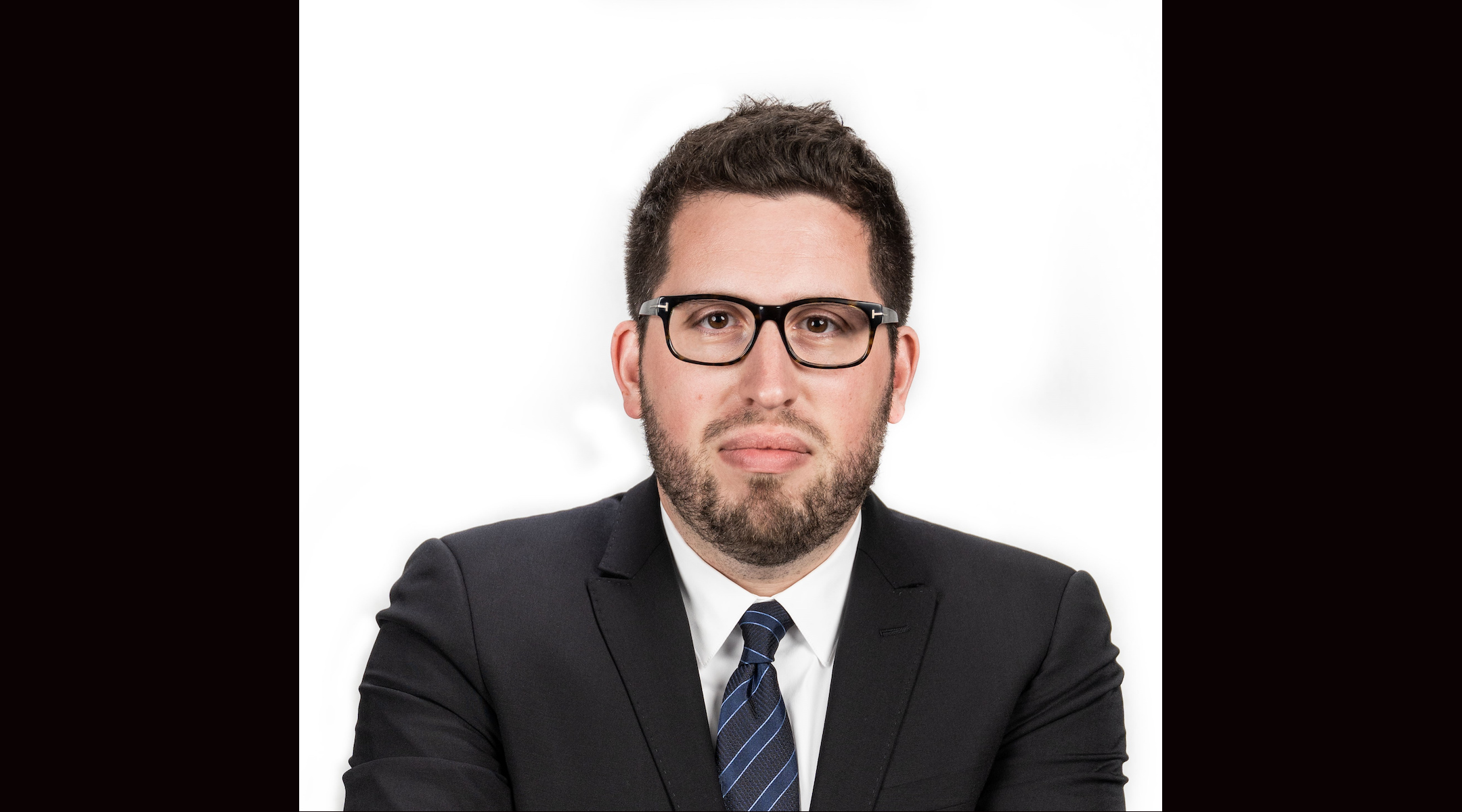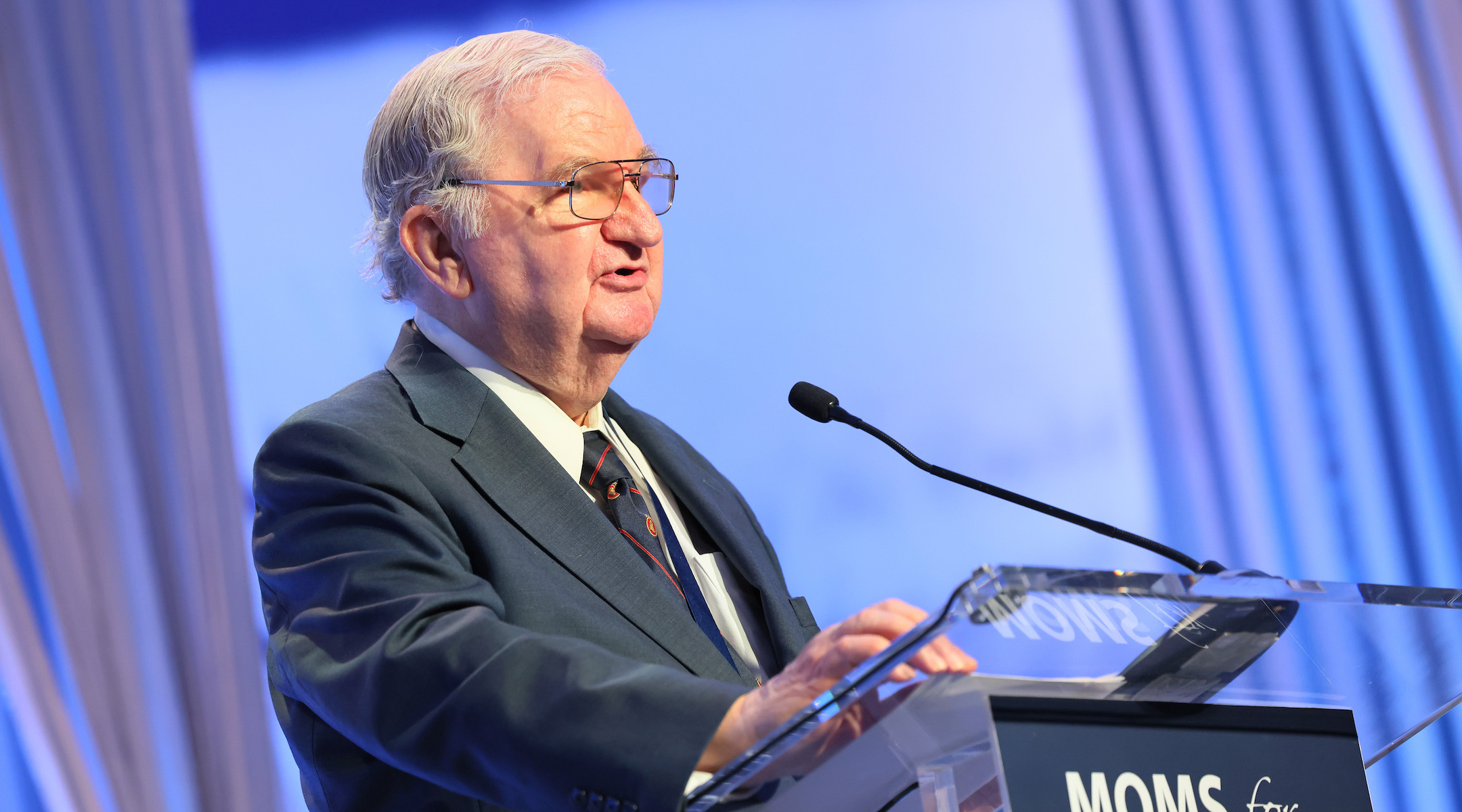Meet Zachary Marschall, the Jewish conservative who leads the nation in campus antisemitism investigations
Marschall has filed dozens of complaints alleging that universities have failed their Jewish students — and he’s not done yet

Zachary Marschall (Courtesy)
(JTA) — When the conservative website Campus Reform published what it said, in all-caps, was an “EXCLUSIVE” about a new federal antisemitism investigation at Arizona State University, it had the rare distinction of being able to cite the complaint that was the trigger.
Quoting from correspondence with the U.S. Department of Education, Campus Reform reported last month that ASU had allowed its Students for Justice in Palestine chapter to host a rally days after the Oct. 7 Hamas attack on Israel. To ensure Jewish students would be kept safe, the complainant (whose identity the department always keeps secret) demanded that the department impose “sanctions against the University to the fullest extent.”
ASU was not happy with the “exclusive.” Campus Reform was not just reporting the complaint, a spokesperson for the university pointed out; the site’s editor in chief, Zachary Marschall, was the person who had filed it in the first place.
“Campus Reform, which says it ‘holds itself to rigorous journalism standards and strives to present each story with accuracy, objectivity, and public accountability,’ first learned about the letter to the Department of Education — because they sent the letter to the Department of Education,” a spokesperson for the university wrote to the Jewish Telegraphic Agency.
The school’s disparaging take on the web site’s journalism ethics belied a broader concern: that Campus Reform is closely entwined with an effort to initiate what has become a mounting tally of antisemitism investigations at U.S. colleges across the country.
In fact, Marschall is the most prolific filer of antisemitism complaints filed under Title VI of the 1964 Civil Rights Act since Oct. 7. He is responsible for at least 12 of the 79 investigations opened so far — and the tally is growing every week as the education department opens new investigations at an unprecedented clip. (Marschall has filed more than 30 complaints in total, at least 15% of the department’s publicly available figures for total “shared ancestry” complaints filed since Oct. 7.)
Marschall, who is Jewish, says he is motivated by what advocates and even the Biden administration has said is a crisis of antisemitism on college campuses.
“If there’s something I can do to help the situation with antisemitism, I’m going to do it,” Marschall told JTA. He also insists his challenges are filed independent of his Campus Reform work, and that he considers himself a journalist rather than an activist.
But his track record paints another picture, of a conservative culture warrior seeking to leverage a little-used federal regulation to undercut elite colleges and universities that he believes have been sullied by progressive values. He is particularly galled by diversity, equity and inclusion initiatives, known as DEI, which have become a punching bag for conservatives and, increasingly, a source of frustration for Jews who do not feel that they fit in.
“The incentive that the scholars have is to always suppress Jewish Americans’ suffering and discrimination, to perpetuate their preferred ideologies and critical frameworks,” he told JTA.
Marschall told the right-wing news outlet Just the News last month that he believed revelations about antisemitism in higher education would bring about “the beginning of the end of DEI.”
Marschall grew up in Syracuse, New York, where his paternal grandfather was a Holocaust survivor and his mother’s father was an attorney active in Democratic politics and the local Jewish community. In 2001, when he was 12, the Syracuse Post-Standard featured him in a story about children who participated in local campaigns — he was canvassing for a mayor candidate who was endorsed by the teachers union.
After graduating from New York University, Marschall earned a master’s degree in arts journalism at Syracuse University and then enrolled in the doctoral program in cultural studies at George Mason University. There, his political inclinations put him firmly in the minority.
“I was the only conservative in a Marxist Ph.D. program,” he recalled. Today he continues to have one foot in academia, as an online instructor for the University of Kentucky.
But it took several years, and stints working in public scholarship, human resources recruitment and at an organization dedicated to “promoting cross-cultural understanding” through the arts, before he landed in conservative media. After the Second Intifada he also leaned more heavily into his Judaism, going from a largely secular upbringing to identifying as belonging to the “no-man’s land” between Conservative and Orthodox. In May 2021 he took a job at Campus Reform, becoming its editor in chief a year later.

Conservative activist Morton C. Blackwell speaks during the Moms for Liberty Joyful Warriors national summit at the Philadelphia Marriott Downtown on July 01, 2023 in Philadelphia. Blackwell’s organization funds Campus Reform, the right-wing college news site whose editor-in-chief Zachary Marschall has become a prolific filer of Title VI campus antisemitism challenges. (Michael M. Santiago/Getty Images)
The news site is funded by an institute associated with longtime Republican activist Morton Blackwell. Marschall manages eight full-time staffers producing stories that rail against everything from trans student activists to “fat studies” programs. According to the analytics tool SimilarWeb, Campus Reform is visited more than half a million times every month.
In the months after Oct. 7, Marschall embraced campus antisemitism as his new cause, seizing on Title VI as a tactic. The clause of the Civil Rights Act prohibits discrimination at federally funded institutions — and allows for the education department to compel schools to change their policies or risk losing funds. Anyone can file a claim, and the department has pledged to investigate all allegations.
When a colleague told Marschall that the Department of Education allows “concerned citizens,” not just students, to file complaints against schools, he snapped into action.
“I did it because I kind of felt that there’s no excuse not to do it,” Marschall told JTA. After Oct. 7, he said, “I just felt like, I’ve described it to people as when a flame gets so hot, it goes from red to almost white or translucent. That’s how I felt. So I did everything I could to write and expose and explain this wave of antisemitism we’re seeing.”
Marschall declined to share the complete text of his complaints with JTA, and the Department of Education doesn’t make complaints public, so a full accounting of their content was not possible. But based on the Campus Reform summaries, they tend to follow common themes.
Most focus on pro-Palestinian statements, protests and social media posts put out by student groups, often SJP chapters, and argue the universities should have done more to stop them. More than one, including ASU’s, concern students who chant the controversial phrase “From the river to the sea, Palestine will be free,” which Jewish groups consider antisemitic but which pro-Palestinian groups have argued is not. One of the incidents cited in his Northwestern complaint was a rally at which students projected the colors of the Palestinian flag onto a campus building.
Marschall insists that he is being discerning in the incidents he chooses to escalate to the Department of Education, whose staffers he said have spent hours speaking to him about his complaints. The department told JTA it does not comment on active investigations.
“What I’m not doing is seeing a Palestinian flag and pointing to it and being like, ‘Oh, that needs to go.’ That’s the opposite of what I believe,” he said. A symbol like the flag only become objectionable, he says, when “it’s being used as a tool for intimidation in the context of what the protests are trying to accomplish.”
Still, the contents of Marschall’s crusade worries some observers of the federal civil rights apparatus.
“It is dangerous and problematic when you have right-wing activists who are essentially co-opting federal civil rights law like Title VI in order, among other things, to make it more difficult on college campuses for both students and faculty to have even basic conversations about the plight of Palestinians right now today in Gaza,” said Jonathan Feingold, a professor of higher education law at Boston University who has written about Title VI and affirmative action.
Miriam Nunberg, a Jewish former Office of Civil Rights attorney who now counsels people considering making complaints to the office, put it more bluntly.
“I don’t like it,” Nunberg said of complaints intended to “make a political point.” She added, “If it’s to further an agenda of just taking down the ‘woke DEI programs,’ I think it’s abhorrent.”
Even some of Marschall’s ideological allies when it comes to the propriety of pro-Palestinian protests say they are skeptical of his tactics. His complaints bear all of the hallmarks of what more seasoned pro-Israel Title VI activists say are signs of weakness in the post-Oct. 7 landscape.
“We don’t think that it serves any good to file frivolous cases, or cases that are not wanted by Jewish students,” said Ken Marcus, a former Office of Civil Rights official who founded the Brandeis Center for Human Rights Under Law, which has filed several recent complaints on behalf of pro-Israel students. “It doesn’t serve the Jewish community to have shoddy complaints that fall apart upon quick investigation.”
Indeed, Marschall’s complaints have come at a rapid clip, sometimes landing within days of the incident they report. They’re also often based on single incidents, not extended patterns, as has historically been the expectation. And while Marschall says he talks to students as often as possible — one complaint, about the University of Massachusetts Amherst, centers on the experiences of a Jewish student who used to write for Campus Reform — he frequently files complaints based on social media and news accounts about incidents on campuses.
“I haven’t spoken to as many Jewish students as I would like to,” Marschall said.
At Johns Hopkins University, students say they were surprised when a complaint by Marschall about faculty and grad student ceasefire statements triggered an investigation there this month.
“Initially, we had no idea as to how or why this complaint was filed, especially because it did not come from Hopkins students themselves,” senior Yael Klucznik, a pro-Israel activist on campus, told the school newspaper. “Some students are upset because this investigation can sound inflammatory, and as though antisemitism on our campus is thriving. We are worried the investigation can portray Jewish student life as worse than it actually is, and drive away Jewish prospective students.”
Still, both Nunberg and Marcus noted that Marschall’s approach has precedent. They compared him to disability-rights activists who travel to college campuses across the country to file Title VI complaints based on accessibility. Some of those activists — among whom Hale Zukas may have been the most prominent — led to substantive changes on various campuses.
And for all of his pessimism about the current direction of higher education, Marschall insists that he believes an about-face is possible.
“My mission is not to destroy, but to restore,” he told JTA. “We all know what assimilation and what access to higher education did for Jews here, as far as social mobility, as far as acceptance. There’s some value there. But that value has been tarnished and diminished in recent decades.”
This article originally appeared on JTA.org.















